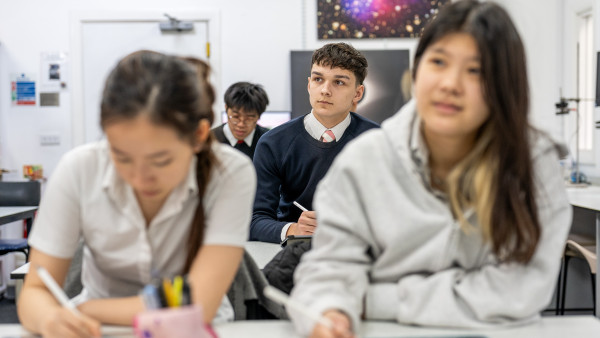A quick search on Google suggests that if St Paul’s School were a car it would be a classic Aston Martin. We disagree. This school is a sleek, possibly hydrogen-fuelled, car of the future. Perhaps it hasn’t been invented yet but our bet is that a St Paul's boy will be behind its creation. Just the place for your bright, curious and fearless son with boundless ambition.
Why read our school review?
Unlike other websites, schools can't pay to be included in The Good Schools Guide. This means our review of this school is independent, critical and fair, and written with parents' best interests at heart.
Unlock to accessOverview & data
- Pupil numbers
- 1,012 ·
- Sixth form numbers
- 425 ·
- Offers boarding
- Yes ·
- Religion
- C of E
- Fees
- Day £35,847; Boarding £53,943 pa
- Local authority
- London Borough of Richmond upon Thames
- Linked schools
Headteacher
High master
Sally-Anne Huang
Since 2020, Mrs Sally-Anne Huang. Read classics and English at Oxford followed by an MA in children’s literature and an MSc in educational leadership and management. Married with two adult sons, this is her third headship but first experience of an
Unlock this review instantly
Learn what pupils and parents really think of this school, along with our expert opinion on the headteacher’s leadership style, the school’s academic results and facilities, the focus on pastoral care, and the range of extra-curricular activities.
Entrance
Brace yourself, there are some hoops to jump through and potential pits to fall down. At 13+, entry into year 9 is primarily geared towards preps (those from state schools can choose 11+ at which point they start at St Paul’s juniors in year 7.
Exit
Majority go onto study STEM subjects at an impressive array of universities. In 2025, 17 to Cambridge, 21 to Oxford, 19 to Imperial, six medics and two dentists. Forty-two headed abroad in 2025, including three to Harvard, three to Dartmouth, three
Latest results
In 2025, 98 per cent 9-7 at GCSE; 91 per cent A*/A at A level (98 per cent A*-B).
A levels or equivalent - Average points score (2024)
What is this?
These figures tell you the average grade and average points that pupils achieved in their academic qualifications. A maximum of 60 points are available for a grade A* at A level.
Teaching & learning
Paulines are very bright, they have to be to jump the high bar to get in here. The challenge is to keep them stimulated, on their toes, stretched and mentally agile. We were impressed with the discipline in the classrooms and throughout the corridors
- Qualifications taken in 2024
- A level
- EPQ
- GCSE
Learning support & SEN
‘A wide range of neurodiverse needs are well supported’ say school. These include ADHD, ASD, dyslexia, physical impairment, dyspraxia and speech and language development. Some arrive at the school with identified learning needs but all pupils are
Arts & extracurricular
Perhaps the single most distinctive feature about St Paul’s is the breadth afforded by the extra-long lunch break. From about 1pm and for the next 100 minutes the place becomes alive as boys swarm to all corners of the school and especially the
Sport
In the first year everyone has a go at everything (there are A – G teams in year 9 rugby) and a huge range of sporting pursuits. Acres of immaculately tended on-site football, rugby and cricket pitches, with nearby Barn Elms also used in the spring
Boarders
It’s easy to forget that St Paul’s is not only a London day school but a boarding school for about 50 boys. Most of these are full boarders, but growing numbers also enjoy the perks of being able to sleep at school during the week and then go home at
Ethos & heritage
‘St Paul’s has been leading the way academically for over 500 years’, declares its website. Founded in 1509 by John Colet, Dean of St Paul’s Cathedral, who entrusted the management and endowment to the company of Mercers. Members of the Mercers
Pastoral care, inclusivity & discipline
The spine of the pastoral system is the tutor system. Tutor groups are arranged vertically with two boys from each year in each group (a maximum 12 boys in total), this provides for a single point of contact for both parents and their sons. The tutor
Mobile phone policy
A clear mobile phone policy is a really important part of modern schooling. This school has provided us with their policy.
Mobile phone policy
Parents are empowered to decide on their child’s mobile phone usage and reminded that, in case of emergency, the school office remains the most appropriate point of contact. Phones must remain silent and concealed during formal events and classes, except in designated areas and during break times. In-class phone usage is only permitted when invited by teachers. Tutor groups oversee phone use, discouraging excessive solitary usage, and educational programmes raise further awareness on excessive phone use. WiFi activity is monitored, and teachers may temporarily confiscate phones during class.
Pupils & parents
Diverse pupil body but what they all share, pupils and parents alike, is that they are aspirational, organised, robust and determined. Some travel long distances (from as far as the home counties and the furthest reaches of London), many families are
Money matters
Known as ‘Founder’s Awards’, nearly 10 per cent of pupils benefit from some level of bursary. A generous scheme, not only providing in some cases more than a hundred per cent financial assistance (it’s possible for music lessons, trips, uniforms and
- Fee information
- Day £35,847; Boarding £53,943 pa
The last word
A quick search on Google suggests that if St Paul’s School were a car it would be a classic Aston Martin. We disagree. This school is a sleek, possibly hydrogen-fuelled, car of the future. Perhaps it hasn’t been invented yet but our bet is that a St






